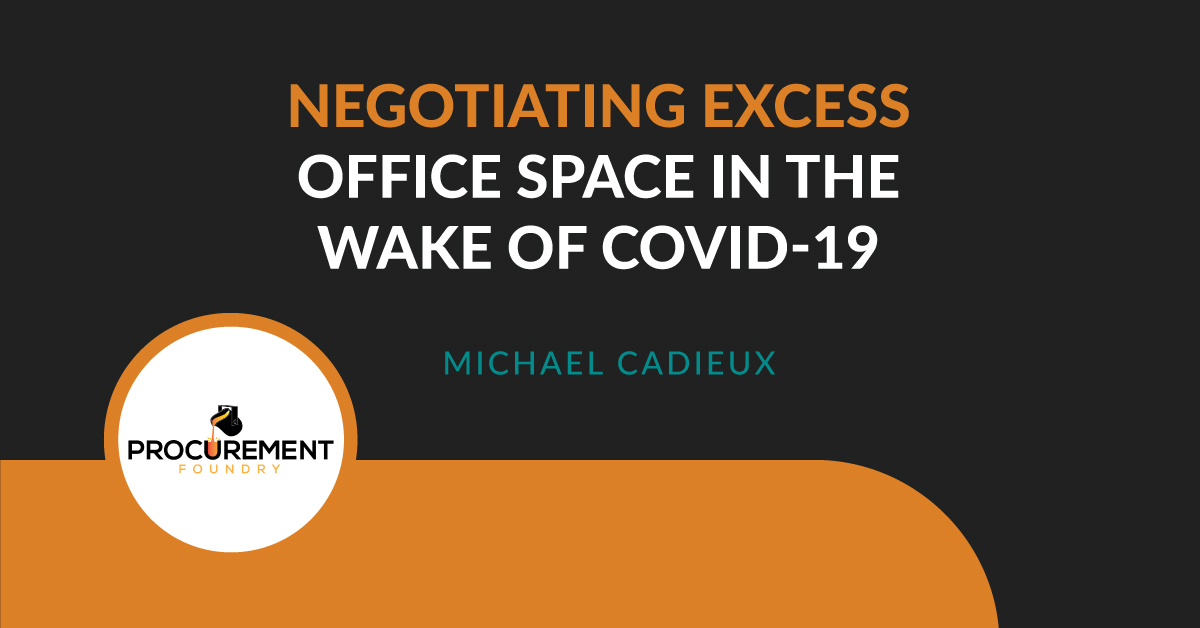Maximizing Savings Opportunities and Procurement's Strategic Value for CPOs
Saving money is not always about pinching pennies: advanced and data-driven insights enable you to identify real cost-saving opportunities, negotiate...
2 min read
![]() Michael Cadieux
:
4/4/22 10:18 AM
Michael Cadieux
:
4/4/22 10:18 AM

COVID-19 has caused a lot of difficulties in commercial real estate, leases, and office spaces. With remote working driving people out of the corporate office and into makeshift home offices, this has left many in leadership feeling in limbo and wondering if they can recoup some of the money spent on their office spaces currently sitting empty.
If you are among those experiencing similar real estate issues, this article shares some expert tips for negotiating excess office space in the wake of COVID-19.
If you are among the tenants looking to negotiate excess office space in the wake of COVID-19, you’ve most likely already experienced the harsh truth that the real estate market is riddled with uncertainties—the likes of which we haven’t seen before. It’s easy to get discouraged, but before you lose hope, take comfort as there may be some options available to you in your contract. This article will cover some of the most common ones.
In some cases, tenants can negotiate for early termination rights. These rights allow a tenant to end the lease before the agreed lease term expires. In most cases, landlords will request that the tenant pay a fee to exercise this option—a costly expense sometimes equalling several months’ rent.
Another common caveat that you should keep in mind with this option is that if your landlord spent any money on your space (repairs, upgrades, etc.), you as the tenant could be responsible for reimbursing your landlord the unamortized portion of these expenditures.
The force majeure clause is a provision that frees business tenants of their contractual obligations if circumstances beyond their control render them unable to keep running their business operations at the property being leased. Examples of force majeure events, commonly referred to as “acts of God,” include natural disasters like hurricanes, earthquakes, or floods. Situations such as war, acts of terrorism, riots, and even labor strikes are also included.
Now, for the bad news. In what has come as a sad surprise to many already, this clause does not cover acts of government (like mandated business closures or pandemics). While it is true that some attorneys have found some success with arguments based on the related common-law concepts of “frustration of purpose” and “impossibility,” such cases have been rare.
When the pandemic hit the scene, businesses found themselves scrambling amid the shift, with their specific commercial accommodation needs suddenly changing. Specifically, most of these businesses were facing a drastic reduction in the need for large office spaces since most workers went remote and were working from home. The result of this was a ton of unused office space sitting empty.
You may not know that there is a clause—known as the contraction clause—that allows a tenant to actually “return” space they are no longer using to the landlord.
Many of us have found ourselves in this situation. If this is you, it’s important to remember that money is already spent, and forcing teams to come back to the office when they don’t want to is not going to help. The truth is that work has already evolved into hybrid models and working from home.
There’s simply no need to exacerbate the talent shortage by angering valuable staff. Instead, focus your efforts on renegotiation.
You have heard the term “going back to the drawing board,” and you can approach renegotiation similarly. Stop and take a moment to evaluate your new business needs, understand your various lease options, check average market rents in your desired area, and triple-check the termination conditions. This will help get you started.
Change can be hard, but it is possible with the right mindset and tools. As you go through this process, keep in mind how effective work from home models have been, and perhaps even use that as the catalyst to approach your stakeholders to do a little re-evaluating themselves by asking: Do our future teams really need this much space?
Are you one who has already navigated this real estate scenario? Join the Foundry and tell us what you’ve done with your excess office space in a work-from-home world.

Saving money is not always about pinching pennies: advanced and data-driven insights enable you to identify real cost-saving opportunities, negotiate...

The topic of our recent roundtable discussion with a dozen Procurement Foundry community members—exploring potential flaws in procurement incentive...

Every 30 days or so, I get the same alert on my phone—“Your electricity bill is available for viewing.” I take a quick look, make sure nothing seems...